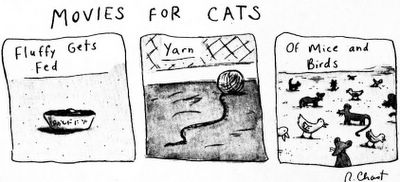I know older people who are gullible and lonely, so this article frightened me.
Extracts from
Bilking the Elderly, With a Corporate Assist
by Charles Duhigg for the New York Times, May 20 2007The thieves operated from small offices in Toronto and hangar-size rooms in India. Every night, working from lists of names and phone numbers, they called World War II veterans, retired schoolteachers and thousands of other elderly Americans and posed as government and insurance workers updating their files. Then, the criminals emptied their victims' bank accounts.
Richard Guthrie, a 92-year-old Army veteran, was one of those victims. He ended up on scam artists' lists because his name, like millions of others, was sold by large companies to telemarketing criminals, who then turned to major banks to steal his life's savings. Mr. Guthrie, who lives in Iowa, had entered a few sweepstakes that caused his name to appear in a database advertised by infoUSA, one of the largest compilers of consumer information.
InfoUSA sold his name, and data on scores of other elderly Americans, to known lawbreakers, regulators say.
InfoUSA advertised lists of "Elderly Opportunity Seekers," 3.3 million older people "looking for ways to make money," and "Suffering Seniors," 4.7 million people with cancer or Alzheimer's disease. "Oldies but Goodies" contained 500,000 gamblers over 55 years old, for 8.5 cents apiece. One list said: "These people are gullible. They want to believe that their luck can change."
"I loved getting those calls," Mr. Guthrie said in an interview. "Since my wife passed away, I don't have many people to talk with. I didn't even know they were stealing from me until everything was gone."
Although some companies, including Wachovia, have made refunds to victims who have complained, neither that bank nor infoUSA stopped working with criminals even after executives were warned that they were aiding continuing crimes, according to government investigators. Instead, those companies collected millions of dollars in fees from scam artists.
Older Americans are perfect telemarketing customers, analysts say, because they are often at home, rely on delivery services, and are lonely for the companionship that telephone callers provide.
Sweepstakes a Common TacticInvestigators suspect that Mr. Guthrie's name first appeared on a list used by scam artists around 2002, after he filled out a few contest entries that asked about his buying habits and other personal information.
He had lived alone since his wife died. Five of his eight children had moved away from the farm. Mr. Guthrie survived on roughly $800 that he received from Social Security each month. Because painful arthritis kept him home, he spent many mornings organizing the mail, filling out sweepstakes entries and listening to big-band albums as he chatted with telemarketers.
"I really enjoyed those calls," Mr. Guthrie said. "One gal in particular loved to hear stories about when I was younger."
By 2004, Mr. Guthrie's name was part of a list titled "Astroluck," which included 19,000 other sweepstakes players, Iowa's records show.
The thieves would call and pose as government workers or pharmacy employees. They would contend that the Social Security Administration's computers had crashed, or prescription records were incomplete. Payments and pills would be delayed, they warned, unless the older Americans provided their banking information.
"I was afraid if I didn't give her my bank information, I wouldn't have money for my heart medicine," Mr. Guthrie said.
Criminals can use such banking data to create unsigned checks that withdraw funds from victims' accounts. Such checks, once widely used by gyms and other businesses that collect monthly fees, are allowed under a provision of the banking code. The difficult part is finding a bank willing to accept them. In the case of Mr. Guthrie, criminals turned to Wachovia.
In all, Wachovia accepted $142 million of unsigned checks from companies that made unauthorized withdrawals from thousands of accounts, federal prosecutors say. Wachovia collected millions of dollars in fees from those companies, even as it failed to act on warnings, according to records.
In 2006, after account holders at Citizens Bank were victimized by the same thieves that singled out Mr. Guthrie, an executive wrote to Wachovia that "the purpose of this message is to put your bank on notice of this situation and to ask for your assistance in trying to shut down this scam." But Wachovia, which declined to comment on that communication, did not shut down the accounts.
During 2005, according to the United States attorney's lawsuit, 59 percent of the unsigned checks that Wachovia accepted from P.P.C. and forwarded to other banks were ultimately refused by other financial institutions. Wachovia was informed each time a check was returned.
Prosecutors argue that many elderly accountholders never realized Wachovia had processed checks that withdrew from their accounts, and so never requested refunds. Wachovia declined to respond.
Some Afraid to Seek HelpBy 2005, Mr. Guthrie was in dire straits. When tellers at his bank noticed suspicious transactions, they helped him request refunds. But dozens of unauthorized withdrawals slipped through. Sometimes, he went to the grocery store and discovered that he could not buy food because his account was empty. He didn't know why. And he was afraid to seek help.
"I didn't want to say anything that would cause my kids to take over my accounts," he said. Such concerns play into thieves' plans, investigators say.
"Criminals focus on the elderly because they know authorities will blame the victims or seniors will worry about their kids throwing them into nursing homes," said C. Steven Baker, a lawyer with the Federal Trade Commission. "Frequently, the victims are too distracted from dementia or Alzheimer's to figure out something's wrong."
Within a few months, Mr. Guthrie's children noticed that he was skipping meals and was behind on bills. By then, all of his savings — including the proceeds of selling his farm and money set aside to send great-grandchildren to college — was gone.
Today, just as he feared, Mr. Guthrie's financial freedom is gone. He gets a weekly $50 allowance to buy food and gasoline. His children now own his home, and his grandson controls his bank account. He must ask permission for large or unusual purchases.
And because he can't buy anything, many telemarketers have stopped calling.
"It's lonelier now," he said at his kitchen table, which is crowded with mail. "I really enjoy when those salespeople call. But when I tell them I can't buy anything now, they hang up. I miss the good chats we used to have."
























 A few of my daughter
Melina's great posts:
A few of my daughter
Melina's great posts:







